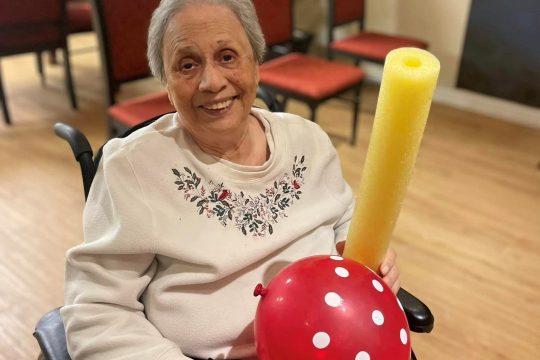
Whether you’ve been recently diagnosed or are spending time with a person who has dementia, staying active and involved has many benefits.
For those with dementia it, keeps you in touch-or reconnects you-with other people, and can help you feel supported and understood. For caregivers, its an opportunity to deepen your bond, support their health and well-being, and provide a sense of purpose and fulfillment for the individual.
To fully experience these benefits, you need to ensure that each activity is meaningful.
Why Meaningful Activities Are Important for Older Adults with Dementia
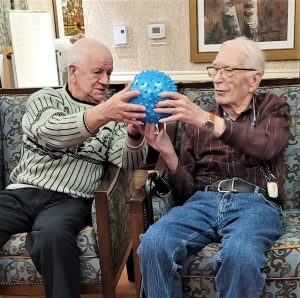 Meaningful activities are those that include physical, social and leisure aspects and are tailored to the individual’s needs and preferences. Providing engaging and fun activities can offer stimulation, help reduce boredom, and bring joy to the lives of people with dementia. It may even reduce challenging behaviors like sundowning.
Meaningful activities are those that include physical, social and leisure aspects and are tailored to the individual’s needs and preferences. Providing engaging and fun activities can offer stimulation, help reduce boredom, and bring joy to the lives of people with dementia. It may even reduce challenging behaviors like sundowning.
The Alzheimer’s Association notes that participating in activities can help a person with dementia by:
- improving quality of life
- providing a sense of normality
- providing a sense of accomplishment, purpose, usefulness, or engagement
- enhancing a sense of dignity and self-esteem
- reducing behaviors such as agitation or wandering.
When planning activities, it’s important to remember that each person is an individual. Therefore, it might take some experimenting or creative thinking to find activities that appeal to them.
10 Things to Remember When Planning Activities for People with Dementia
Every person with dementia follows their own unique course of illness. Some persons lose language early; others remain very verbal. Some advance rapidly; others do not. For these reasons, it’s important that activities be individualized as much as possible, and that people be given as much choice as possible. Here are 10 great guidelines for planning activities.
1. Match the activity to the person’s ability.
Above all, choose activities that are age appropriate. It is crucial to maintain dignity as well as attention. If an activity is too simplistic or childish (like coloring books for kids)–or too hard and above the person’s cognitive level–it will frustrate them.
2. Avoid over-stimulation.
Try not to overstimulate the person with dementia. Be selective with outings. Avoid crowds, constant movement, and noise.
3. Include “unplanned” activities.
Encourage your loved one to be involved in daily life, with activities such as setting the table, watering plants, or folding laundry. This will help them feel a sense of accomplishment and success. Try to create a mix of guided and self-initiated activities.
4. Relate activities to the person’s interests, life story, and strengths.
Design an activity around a person’s past or present whenever possible. Help them get started on an activity, then decide whether he or she can do the activity alone or needs help.
5. Connect activities to memories.
People with early dementia often have excellent memories of past events. Singing old songs, looking through family photos, memorabilia, and books can help them with recall.
6. The best activities involve the 5 senses.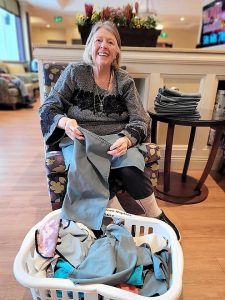
Sensory activities are enjoyable for those in all stages of dementia. However, they are particularly helpful for people in the advanced stages who may no longer be able to participate in groups.
7. Communicate effectively.
Practice active listening, speaking clearly, and using simple sentences. Giving compliments and asking for opinions helps a loved one or caregiver better connect with the person, which leads to a more fulfilling interaction.
8. Consider Timing.
To achieve the most success when carrying out activities, consider the times of the day when the person is at their best. For example, for some walking is best done in the morning or the early afternoon. For people who become restless later in the day, a late afternoon walk may be better. Choose calm and relaxing activities, like a hand massage, around bedtime. Try and do things at a similar time each day. And remember, an activity that was a great success one day may not receive the same welcome the next.
8. Celebrate the moment.
Older adults with dementia often lose the ability to be self-affirming–as a result of loss of insight, language, and memory–and need small doses of affirmation throughout the day. Smile, make eye contact, or tell a funny joke. Use touch when appropriate. These all build bonds of friendship and trust.
9. Weave music into activities as much as possible.
For many people with dementia, a sense of movement and rhythm is retained. Music remains a source of joy and often connects them with positive memories.
Safety note: Proper supervision is important in dementia care. An ounce of prevention goes a long way!
Activities to Support People with Early and Moderate Dementia
For people with mild to moderate dementia, it is important to provide stigma-free, normalized experiences based on their interests. Here are some of our favourites:
- Adaptive cards
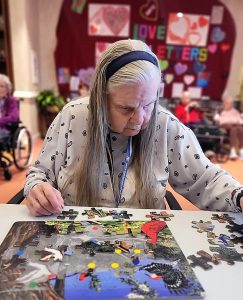
- Balloon badminton or volleyball
- Bocce ball or bowling
- Brain fitness or Neurobics
- Chair volleyball
- Cooking and baking
- Creating a life story book or memory box
- Dancing
- Dominoes
- Exercising (walking in the park, sit-to-stand motions, yoga)
- Gardening
- Horseshoes
- Music or sing-alongs
- Painting, drawing, sculpting, crafts
- Pass the ball, stop the music
- Puzzles
- Reading out loud
- Reminiscing
- Short stories and discussion groups
- Shuffleboard
- Simon says game
- Table games
Activities for People in the Later Stages of Dementia
Activities for a person in the late or advanced stages of dementia should be stimulating but not challenging. Choose activities that are repetitive and divide them into small tasks. Conduct activities with compassion, patience, sensitivity, and respect.
- Bird watching
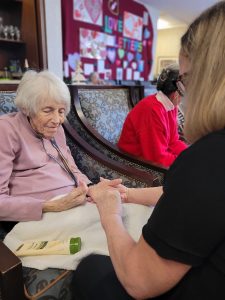
- Fabric boxes
- Hand Massage
- Matching colours or shapes
- Music
- Pairing and sorting
- Pet Therapy
- Photo Albums
- Physical Contact
- Read aloud
- Scent stimulation
- Sensory Bean Bags
- Sensory boxes or books
- Sight Stimulation
- Stuffed toys or lifelike dolls
- Sunshine & fresh air
All Seniors Care BLOSSOM Living Supports Inclusiveness
You don’t need a great memory to enjoy yourself. Each day, there are many things that provide people living with a dementia diagnosis with purpose and pleasure.
Designed to help people experiencing mild to moderate cognitive decline, our BLOSSOM Living program centres on inclusiveness, engagement, and providing opportunities for meaningful activities. With its holistic approach to physical, cognitive, and social stimulation, older adults who choose the BLOSSOM Living option maintain purposeful connections within the community.
As a result of the caring staff and supportive social network, residents remain independent for longer and spouses are able to stay together. After all connection and a sense of belonging are essential to well-being and quality of life.
Age-Friendly Communities Empower Seniors to Thrive
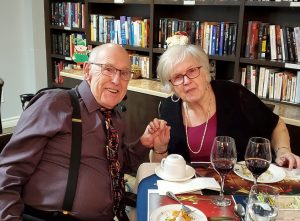 In Canada, social inclusion has been underlined as essential for people with dementia. Our age-friendly communities are inclusive environments that promote active and healthy ageing for all older adults.
In Canada, social inclusion has been underlined as essential for people with dementia. Our age-friendly communities are inclusive environments that promote active and healthy ageing for all older adults.
If you are considering memory care for your loved one with dementia, All Seniors Care can help. Our extensive experience and expert knowledge can help direct you to the senior community that will best meet the unique needs of your loved one. Contact us on 1-866-797-7169.
Writer – Julianna McLeod
Julianna is a health and wellness expert at All Seniors Care. Her mission is to create content that empowers seniors to form sustainable solutions for lasting health and happiness. She is an experienced writer, editor, and Recreational Therapist living in Toronto.